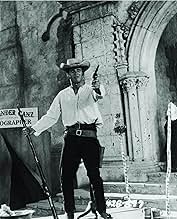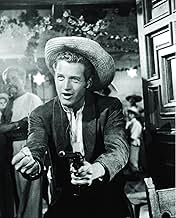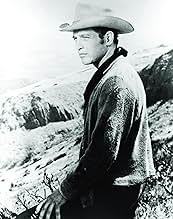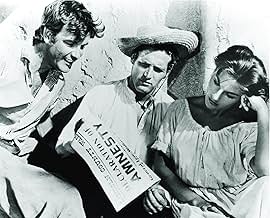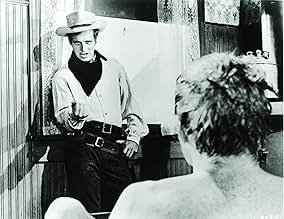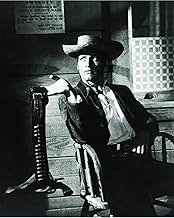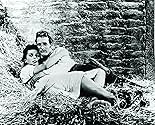IMDb RATING
6.4/10
4.9K
YOUR RATING
After his employer is murdered by rival cattlemen, a troubled and uneducated young cowboy vows revenge on the murderers.After his employer is murdered by rival cattlemen, a troubled and uneducated young cowboy vows revenge on the murderers.After his employer is murdered by rival cattlemen, a troubled and uneducated young cowboy vows revenge on the murderers.
- Awards
- 1 win total
Robert Anderson
- Hill
- (as Bob Anderson)
Josephine Parra
- Bride
- (as Jo Summers)
- Director
- Writers
- All cast & crew
- Production, box office & more at IMDbPro
Featured reviews
One of the strangest westerns ever made. Arthur Penn's "The Left Handed Gun", adapted from a play by Gore Vidal, came right at the height of the 'teenage rebel' cycle of the fifties with Paul Newman's Billy the Kid having more in common with James Dean's Jim Stark than any Western outlaw I can think of. The film wasn't a success; it's highfalutin dialogue and over-the-top acting proving too much for a general audience who, if they looked just below the surface, would have easily detected a homosexual subplot involving Hurd Hatfield's character who acts as a kind of Greek Chorus. It marked the screen debut of Penn who didn't make another film for four years though it's now built up something of a cult reputation. It isn't really very good, and it is very self-concious, but it is also too bizarre to dismiss out of hand.
I wonder what the mature Paul Newman thought of this early movie performance. Of course, 'mature' is a relative term since he's already 33 here, well beyond the 'kid' range. In my little book, it's the most mannered and misdirected acting of his long and distinguished career. It's almost like he's working at an excess of James Dean. That wouldn't be surprising since the screenplay's Billy comes across as more misunderstood youth than cold-blooded killer. I guess this is the first of director Penn's efforts at rehabilitating notorious American outlaws, leading up to the glossy Bonnie and Clyde (1967).
The movie itself is pretty good, the open range locations even looking like eastern New Mexico, while Penn uses them to good effect. But it's really James Best as the ill-fated henchman Tom who steals the film. His supporting role manages a certain poignancy that should have come from Billy, but doesn't. With the right breaks, I think Best could have carved a real niche in films. Speaking of supporting players, with the exception of the cartoonish Moultrie (Hatfield), they appear recruited from the many TV Westerns of the day, especially the familiar Denver Pyle and the classy John Dehner.
Penn establishes himself here as a moviemaker to watch with a number of nice touches— having Pyle squint into the sun just before the fateful moment, the lone boot left standing in the road, and others. I'm kind of sorry that the baby-faced Audie Murphy didn't get a shot at Billy's role. Visually, he's perfect. Plus, surprisingly for that boyish appearance, he could do a killer-stare to make you believe he killed 100 Germans during the war. Also, Murphy could have made that key facedown scene with Joe Bell (Pryor) as genuinely chilling as it should be. For whatever the charming Newman's considerable skills, being downright mean is not one of them. Anyway the movie remains an interesting entry on the road to 1960's-style rebellious movie-making.
The movie itself is pretty good, the open range locations even looking like eastern New Mexico, while Penn uses them to good effect. But it's really James Best as the ill-fated henchman Tom who steals the film. His supporting role manages a certain poignancy that should have come from Billy, but doesn't. With the right breaks, I think Best could have carved a real niche in films. Speaking of supporting players, with the exception of the cartoonish Moultrie (Hatfield), they appear recruited from the many TV Westerns of the day, especially the familiar Denver Pyle and the classy John Dehner.
Penn establishes himself here as a moviemaker to watch with a number of nice touches— having Pyle squint into the sun just before the fateful moment, the lone boot left standing in the road, and others. I'm kind of sorry that the baby-faced Audie Murphy didn't get a shot at Billy's role. Visually, he's perfect. Plus, surprisingly for that boyish appearance, he could do a killer-stare to make you believe he killed 100 Germans during the war. Also, Murphy could have made that key facedown scene with Joe Bell (Pryor) as genuinely chilling as it should be. For whatever the charming Newman's considerable skills, being downright mean is not one of them. Anyway the movie remains an interesting entry on the road to 1960's-style rebellious movie-making.
There have been forty-six feature films made about the life of Henry McCarty, alias William H. Bonner, alias Billy the Kid. All movies mix fact and fiction to a greater or lesser degree but one of the few sympathetic portraits of the young outlaw is Arthur Penn's 1958 film The Left-Handed Gun starring Paul Newman. Newman's Billy is a confused, emotionally unstable personality rather than a cold-blooded killer, and Penn would have us believe that Billy killed because he was forced to defend himself and his honor, not just for the thrill of it. Based on the teleplay, "The Death of Billy the Kid" by Gore Vidal, The Left-Handed Gun is a very entertaining film but feels more like a star vehicle for Newman than a film that strives to be challenging or complex. Newman captures Billy's humor and sense of fun but is too old (33) for the role and his cynical swagger seems inappropriate for the slow-witted teenager.
Billy the Kid grew up among settlers of the new towns in the American Southwest made up of cattle thieves, gamblers, and murderers. He was an illiterate drifter until John Tunstall (Keith Johnston), a friendly English rancher, took him under his wing and became a father figure. In the film, Billy becomes devoted to Tunstall (in reality Tunstall was only 24) and when the rancher is killed by a deputy and three others sent to take Tunstall's cattle and property because of his partnership with McSween in the mercantile business in Lincoln, Billy vows revenge. Together with his buddies, Tom Folliard (James Best) and Charlie Boudre (James Congdon), they track down the killers one by one until Billy is arrested and jailed by lawman Pat Garrett (John Dehner) after the last of the foursome is murdered on Garrett's wedding night. When Billy escapes from jail, killing his guards in the process, Garrett tracks him to the Chihuahuan Desert where the story of Billy the Kid's life ends and the myth begins.
Billy the Kid grew up among settlers of the new towns in the American Southwest made up of cattle thieves, gamblers, and murderers. He was an illiterate drifter until John Tunstall (Keith Johnston), a friendly English rancher, took him under his wing and became a father figure. In the film, Billy becomes devoted to Tunstall (in reality Tunstall was only 24) and when the rancher is killed by a deputy and three others sent to take Tunstall's cattle and property because of his partnership with McSween in the mercantile business in Lincoln, Billy vows revenge. Together with his buddies, Tom Folliard (James Best) and Charlie Boudre (James Congdon), they track down the killers one by one until Billy is arrested and jailed by lawman Pat Garrett (John Dehner) after the last of the foursome is murdered on Garrett's wedding night. When Billy escapes from jail, killing his guards in the process, Garrett tracks him to the Chihuahuan Desert where the story of Billy the Kid's life ends and the myth begins.
Like the precedent user said,all that will follow in Penn's best works is already here:the search of a father,the marginal hero,incapable of becoming part of a community.In "Miracle worker", which I look upon as his masterpiece,Helen's father is thoroughly unable to communicate with his daughter who immures herself in her autism.In "the chase" Robert Redford's character has been an outcast for his whole life.In "Bonnie and Clyde" ,not only Penn depicts par excellence marginal characters but he also introduces CW Moss's character ,whose father is a mean old man,and who loves the two gangsters as his parents.
At the beginning of the movie ,Billy is still a boy searching for his identity.His boss,who reads him the Bible ("through a glass,darkly"),gives him what he's longing for.One must notice that the relationship Billy/his boss-father is too short on the screen to be really convincing.This is accentuated by the fact that the supporting cast is faceless,and once his "dad" is dead,Newman carries the movie on his own:his performance is typically "actor's studio",very deep,very introspective,in a nutshell he plays Billy as he would play a Tennesse Williams character.We're far from the western actor,such as John Wayne or Joel McCrea.The sentence "I do not want you" often comes in the lines and drives Billy to despair and violence.Actually it's the last sentence he hears from the man he loves so much.
Because they have no shoulder to lean on,Penn's heroes are doomed oedipean human beings and except for Helen in "Miracle worker",their destiny leaves them no hope.
At the beginning of the movie ,Billy is still a boy searching for his identity.His boss,who reads him the Bible ("through a glass,darkly"),gives him what he's longing for.One must notice that the relationship Billy/his boss-father is too short on the screen to be really convincing.This is accentuated by the fact that the supporting cast is faceless,and once his "dad" is dead,Newman carries the movie on his own:his performance is typically "actor's studio",very deep,very introspective,in a nutshell he plays Billy as he would play a Tennesse Williams character.We're far from the western actor,such as John Wayne or Joel McCrea.The sentence "I do not want you" often comes in the lines and drives Billy to despair and violence.Actually it's the last sentence he hears from the man he loves so much.
Because they have no shoulder to lean on,Penn's heroes are doomed oedipean human beings and except for Helen in "Miracle worker",their destiny leaves them no hope.
Billy the Kid seeks revenge for the murder of his employer. This oft-told tale gets the psychological treatment in this account based on a play by Gore Vidal. Newman replaced first choice James Dean, and seems to be doing a Dean impression of the misunderstood youth, along the lines of "Rebel Without a Cause." Since Newman was rarely guilty of overacting, the blame here must fall on Penn, directing his first film after years of "playhouse" work on TV that encouraged exaggerated acting. Furthermore, the film is choppy and drab looking. Penn of course got better with experience. The biggest joke is that Billy the Kid was actually right handed.
Did you know
- TriviaThe film originally was to have been made in 1956 with James Dean in the lead role.
- GoofsThe film is about western outlaw Billy the Kid, who was actually right-handed.
- ConnectionsFeatured in Legends of the West (1992)
- SoundtracksBallad of The Left Handed Gun
Written by William Goyen and Alexander Courage
[Movie theme ballad played over the opening title card and credits]
- How long is The Left Handed Gun?Powered by Alexa
Details
- Release date
- Country of origin
- Languages
- Also known as
- The Left Handed Gun
- Filming locations
- Production companies
- See more company credits at IMDbPro
Box office
- Budget
- $700,000 (estimated)
- Gross worldwide
- $5,066
- Runtime
- 1h 42m(102 min)
- Color
- Aspect ratio
- 1.85 : 1
Contribute to this page
Suggest an edit or add missing content


